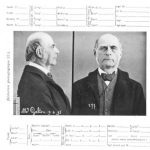ethics
Kim Krisberg and I are currently in Denver at APHA’s 2016 Annual Meeting and Exposition — the year’s largest gathering of public health professionals. In yesterday’s blog post, Kim recapped just a few of the scientific sessions and events from Sunday and Monday. Below are some highlights from Tuesday and you can read many more courtesy of the APHA Annual Meeting Blog.
How can we reduce gun violence? Less politics, more working together: The gun violence epidemic in America got worse in 2016. As of October, more than 40 people every day have died in the U.S. by gunfire, according to the…
There is a myth about how science progresses: great men have a eureka moment, and rush in to the lab to do the definitive experiment, often bravely and with the opposition of the Science Establishment, and single-handedly revolutionize a discipline. It's nonsense. I can't think of a single example of that kind of work that has gotten anywhere -- the closest might be Isaac Newton, who developed some great ideas working privately at his home in Woolsthorpe, but even he was tightly connected to a community of fellow scientists. Science is very much a communal and communicative endeavor, and is…
Every year in my intro biology course, I try to do one discussion of bioethics. One lecture is not much, but this is a course where we try to introduce students to the history and philosophy of science, and I think it's an important issue, so I try to squeeze in a little bit. So we spend one day talking about eugenics and the Tuskegee syphilis study, and I have them read Gould's Carrie Buck's Daughter, and I try to provoke them into arguing with me, or at least questioning a few default assumptions.
This semester, though, I'm going to have them read something with some subtler concerns. I'm…
I did a fun exercise with my Umeå archaeology freshmen Monday: a role-playing debate about the ethics of burial archaeology. The framework was a hearing at the Ministry of Culture regarding a planned revision of the Ancient Monuments Law.
I assigned randomised groups of up to 4 students roles as archaeologists, neopagans, the Swedish Church, a housing development firm, Satanists, Saami nationalists and recently arrived Syrian Orthodox Turks. Each group got a slip of paper telling them what their opinions were about burial archaeology, above-ground curation of human remains and reburial. I…
A correspondent asked me an interesting and difficult question about the sponsorship of science. I've been talking a bit lately about the allosaur affair at the Creation "Museum", which can be summarized this way:
Michael Peroutka, an odious neo-Confederate nut, donates a valuable allosaur fossil to the Creation "Museum".
Now the tricky part. What's the difference in principle between that statement and this next one?
David Koch, an odious destroyer of the environment and climate change denialist, donates $35 million for a Smithsonian dinosaur hall redesign.
That's a good question, and it…
Brianne writes fairly frequently about her experiences as a clinic escort, dealing with shrieking fanatics who stand on sidewalks harassing people going into family planning clinics. They're hideous and awful and have lost all sense of perspective and humanity, and they're also remarkably ineffective…unless, of course, their goals are to make other people miserable and to expose their own obsessive inhumanity.
They have a lot in common with another group, animal rights protesters. Sanctimonious assholes, all of them. They're all over UCLA, and they're busy protesting researchers' homes, at…
Let's say you want to do a market-related study in which you gain entry to one thousand homes representing sets of people defined by the usual variables of income, ethnicity, urban-suburban lifestyle etc. The first thing you do is to ask a few people, real nice like, if you can go through their stuff and take a lot of photographs and notes. Most of them say no, and you perhaps even discover that the one or two who actually agree to this are odd ducks. So you go to Plan B. This involves breaking into the homes when the people are out so you can get your data despite the fact that they don't…
A few weeks ago I gave a talk in Seattle in which I pointed out that science is not sufficient to define moral behavior. A substantial part of that talk was a catalog of atrocities, such as the Tuskegee syphilis experiment. I said that in purely scientific terms, that was a good experiment; if the subjects had been mice, for instance, setting aside an untreated control group to study the progression of the disease would have been considered an essential part of smart experimental design. One could still argue that the needs of the many outweigh the needs of the few…if one were willing to…
You've probably heard this explanation for the virtue of religion: that even if god doesn't exist, belief in god (or some other monitoring authority) makes people behave more morally. There have been many experiments that have actually shown that people are nicer or more generous when exposed to religious concepts, such as this one by Norenzayan and Shariff.
In one of their own studies, they primed half the participants with a spirituality-themed word jumble (including the words divine and God) and gave the other half the same task with nonspiritual words. Then, they gave all the participants…
After that debate between Tzortzis and Lawrence Krauss that was overshadowed by the disgraceful anti-egalitarian exhibition of Muslim misogyny, iERA is now trying a new tactic: they're releasing tiny snippets of the debate that they believe they can spin into anti-Krauss sentiment. Here's a perfect example, Krauss's reply to a question about the morality of incest.
The audience gasped when Krauss said it's not clear to him that incest is wrong, and then he went on to argue that there are biological and societal reasons why incest is not a good idea, but that he'd be willing to listen to…
Every once in a while, I hear these stirrings from scientists that there can be an objective morality, and that by following reason and evidence we can achieve great advances in ethics and reduce human suffering. I agree, in part. I think reason and science are the only ways we can implement our goals effectively, and that we should be empirically assessing our progress and making changes as necessary in a rational way. But — and this is a huge exception — science is not sufficient. Scientists are flawed, and while you can use science to optimally reach a particular goal, setting that goal in…
"Prediction is very difficult, especially if it's about the future." -Niels Bohr
What's going to happen next? It's perhaps the most important thing to know if we want to be prepared for practically anything in our lives. And without even thinking about it, most of us are actually very good at this in a huge number of aspects of our lives. For example...
Image credit: Crazy Adventures in Parenting.
I was hungry at work today, and I was prepared for it. Somehow, I knew that I was going to need food throughout the course of the day, and so I was prepared for it by bringing food from…
This is a rather chilling story of academic freedom getting trampled. A whole pile of documentation is available at that link, I'll try to simplify it down a lot.
UC Davis was sponsoring a public seminar on prostate cancer; specifically, they were actively promoting the prostate specific antigen (PSA) test. One professor, Michael Wilkes, objected — the PSA test is now discouraged as worse than useless. Wilkes is a specialist in prostate cancer; he knew this. Heck, I knew this, and my local MD knows this. He explained to the department that was sponsoring the seminar that it was wrong, and he…
The news was just publicly announced that the University of Maryland is now the 2nd hospital to perform full face transplant in the US. Just a handful of these procedures have been performed around the world, and they are enormously complex ethically, surgically and medically.
To begin with, long before the surgery even became a possibility, there have been years of work put into setting up such a novel transplant program. Besides obtaining approval for what is still an experimental procedure from an IRB, it is necessary to very carefully screen a population of potential recipients. A face…
Have you ever walked around an 19th century (or earlier) graveyard? It gives you a depressing snapshot of the old reality: so many young women dead in childbirth, so many children reaped by diseases. We've been fortunate, we residents of the late 20th and early 21st centuries, that so many of those lethal conditions are treatable, and we're mostly able to live without fear of our children dying in our arms. But here in the United States, we may have been living in a brief window of time in which treatments are both available and affordable, and are moving into an era where they're available,…
He's a delusional kook, but Collins is also a competent administrator, and I have to give him credit when he does the right thing.
The NIH, led by Dr. Collins, has recently accepted a recommendation from the National Institute of Medicine that future chimpanzee research funding shall be suspended, and that exceedingly strict guidelines are to be imposed.
They're just too close to us, and should fall under the penumbra of the same ethical considerations we apply to humans. I'd say the same of gorillas and orangutans…but I don't think there is any biomedical research being done on those…
On Deltoid, Tim Lambert reports that Wolfgang Wagner, Editor-in-Chief of the journal Remote Sensing, has taken personal responsibility for the publication of a "problematic" paper and resigned his role. Wagner writes, "With this step I would also like to personally protest against how the authors and like-minded climate sceptics have much exaggerated the paper's conclusions," in stories such as "New NASA data blow gaping hole in global warming alarmism" (published by Forbes) and "Does NASA data show global warming lost in space?" (published by Fox News). On Class M, James Hrynyshyn asks "…
There's been a lot of excellent posts debunking Standard & Poor's recent downgrade of U.S. debt on the merits--it is poor assessment of risk. Yes, there are substantive economic arguments against S&P's evaluation. But S&P is also fundamentally corrupt. The Coalition of the Sane must point this out too--there is an ethical dimension here, not just an economic one.
The critical point is this: during the last year, every negative statement by S&P has followed action by the federal government to investigate possible fraud by S&P (and other ratings agencies) during the…
This married couple are good brave human beings.
Hege Dalen and Toril Hansen have rightly become national heroes in Norway after they rescued 40 fleeing teens from the massacre on Utoya Island. Using their boat, they made multiple trips into the waters around Utoya where Anders Breivik was murdering 69 people and ferried as many as they could to safety. Bullet holes later discovered in their boat indicate Breivik fired upon them.
Scum of the earth. Parts of Michele Bachmann's district contain the most smug, pious, conservative rat-buggering jerks on the planet (like Marcus Bachmann and his anti-gay "clinic", for instance). And the symptoms are beginning to show: the Anoka-Hennepin school district, part of Bachmann's domain, home of the Elmer Gantry-wannabe Bradley Dean, is also the epicenter of an epidemic of teen suicides, 9 in the last two years. These are kids who were bullied for being gay, or suspected of being gay, or not fitting in to the their inbred little community (and who would want to?), and the school…




